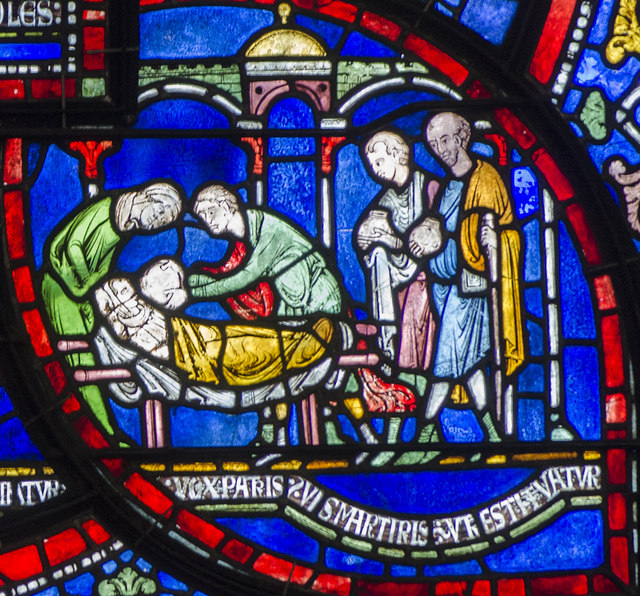“The storm exposes our vulnerability and uncovers those false and superfluous certainties around which we have constructed our daily schedules, our projects, our habits and priorities. It shows us how we have allowed to become dull and feeble the very things that nourish, sustain and strengthen our lives and our communities. The tempest lays bare all our pre-packaged ideas and forgetfulness of what nourishes our people’s souls.”
This has really gotten me thinking that actually this most unusual time, being thrown completely from our ordinary routines, might constitute a truly important, once-in-a-lifetime opportunity to stop and re-examine our lives: our schedules, projects, habits and priorities. For those who wish to join me in this, I commend the 5 Steps to Renewal in your Relationship with God.
In writing that guide this week, I began with a very simply question for reflection: does God have first place in my life? Subsequently, however, I have found myself pondering whether this might be an entirely new thought for some people. Some might well be pondering - should God have first place in my life? Is is realistic to think of loving God more than one’s children? One’s spouse? One’s important work?
The very challenging answer which needs to come back, of course, is ‘yes’. God is the highest good, by definition; and so, if I find myself worshipping Him simply as one good among many in my life, then I’m not really worshipping God, at all. There can be an evident danger in a lot of religious practice - among believers of all religions - of simply practising faith as part of a balanced healthy lifestyle. It’s good the psyche and the emotions; keeps everything lined up. All things in moderation - diet, exercise, spirituality, but none of them to excess.
Yet this is not the language of Jesus Christ.
"If any man would come after me, let him deny himself and take up his cross and follow me. For whoever would save his life will lose it, and whoever loses his life for my sake will find it." (Matthew 16.24-25)
“If any one comes to me and does not hate his own father and mother and wife and children and brothers and sisters, yes, and even his own life, he cannot be my disciple.” (Luke 14.26)
“Again, the kingdom of heaven is like a merchant in search of fine pearls, who, on finding one pearl of great value, went and sold all that he had and bought it.” (Matthew 13.45-46)
Jesus’ commitment to His Father was total - and in this He gave us the example. It is in giving ourselves totally to God, that we find the way to life.
Perhaps the paradigm Biblical story of what it is to love God above all is found in that of Abraham & Isaac. Abraham had longed for a son, but had never had one. Nevertheless, God promised him that he would, and after many years of waiting - in both his and his wife’s old age - they had a son, named Isaac. Isaac was obviously to become the apple of Abraham’s eye. But, when Isaac was a boy, God put Abraham to the test:
and said to him, “Abraham!” And he said, “Here am I.” He said, “Take your son, your only son Isaac, whom you love, and go to the land of Mori′ah, and offer him there as a burnt offering upon one of the mountains of which I shall tell you.” So Abraham rose early in the morning, saddled his ass, and took two of his young men with him, and his son Isaac; and he cut the wood for the burnt offering, and arose and went to the place of which God had told him. On the third day Abraham lifted up his eyes and saw the place afar off. Then Abraham said to his young men, “Stay here with the ass; I and the lad will go yonder and worship, and come again to you.” And Abraham took the wood of the burnt offering, and laid it on Isaac his son; and he took in his hand the fire and the knife. So they went both of them together. And Isaac said to his father Abraham, “My father!” And he said, “Here am I, my son.” He said, “Behold, the fire and the wood; but where is the lamb for a burnt offering?” Abraham said, “God will provide himself the lamb for a burnt offering, my son.” So they went both of them together.
When they came to the place of which God had told him, Abraham built an altar there, and laid the wood in order, and bound Isaac his son, and laid him on the altar, upon the wood. Then Abraham put forth his hand, and took the knife to slay his son. But the angel of the Lord called to him from heaven, and said, “Abraham, Abraham!” And he said, “Here am I.” He said, “Do not lay your hand on the lad or do anything to him; for now I know that you fear God, seeing you have not withheld your son, your only son, from me.” And Abraham lifted up his eyes and looked, and behold, behind him was a ram, caught in a thicket by his horns; and Abraham went and took the ram, and offered it up as a burnt offering instead of his son. So Abraham called the name of that place The Lord will provide; as it is said to this day, “On the mount of the Lord it shall be provided.”
And the angel of the Lord called to Abraham a second time from heaven, and said, “By myself I have sworn, says the Lord, because you have done this, and have not withheld your son, your only son, I will indeed bless you, and I will multiply your descendants as the stars of heaven and as the sand which is on the seashore. And your descendants shall possess the gate of their enemies, and by your descendants shall all the nations of the earth bless themselves, because you have obeyed my voice.” (Genesis 21.1-18)
Some modern commentators might ask the question - what sort of God asks this of someone? This, is perhaps missing the point that this ancient text is trying to communicate. God looks for us to love Him above all else. It is indicated that this event took place in the land of Mori’ah, traditionally held to be Mt. Moriah. This would be the place where 1,000 years later King David would buy the threshing floor from Araunah the Jebusite and where King Solomon would build the Temple. And it would be here that some 1,000 years later Jesus Christ would stretch out His arms on the Cross in the perfect act of self-giving, uniting Himself to the Father’s will for the Redemption of the whole world.
So let us take Pope Francis’ invitation in this time to examine our lives for false and superfluous certainties, and have the courage to really examine our live to see: am I living mostly for myself, or, for God - and those to whom He sends me?
------------------------------------------------------------------------------------------------------------------------------------------------------------
Stay up-to-date with lonelycurate.com by click the 'Follow' button on the top right hand side, or you can follow me on Facebook or Twitter. If you found this helpful, please share this article using the buttons below.





















